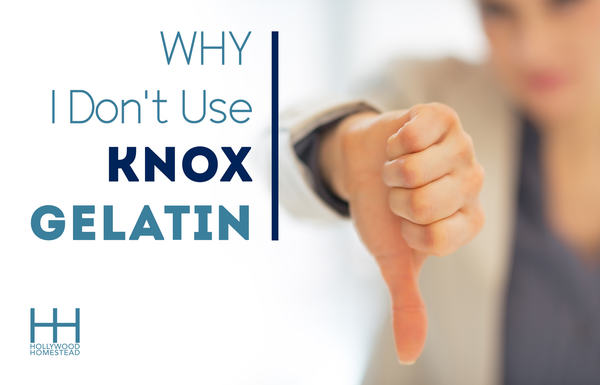
When it comes to gelatin, Knox Gelatine is the brand that most of us know best. Part of the reason is because Knox Gelatine was the first commercial brand of gelatin and has been around since the 1840s. It is still available in just about every supermarket and cheap to buy.
If you want to make a gummy dessert, Knox Gelatine will do the trick (Not that I’d recommend eating Knox Gelatine even for this purpose though!).
But here’s the thing:
Many people buy gelatin because they heard about its many health benefits, such as:
- Helping with weight loss
- Joint health
- Bone health
- Digestive healing
- Healthier hair
- Better skin (even fights wrinkles!)
If it is these health benefits you are after, then I don’t recommend using Knox Gelatine! Here is why.
*Before you ask, Knox uses the UK spelling gelatine instead of the US spelling gelatin. It’s not a typo! 🙂
Knox Gelatine Is Made from Factory Farm Animals
Gelatin is made from the bones, skins, and connective tissues of animals. This probably sounds weird or even gross to a lot of people. However, these are things we really should be eating more of!
The amino acids (which are the building blocks of proteins) in connective tissues are different than the amino acids found in muscle meat. Since we mostly eat muscle meat, we end up with too many of certain amino acids and not enough of other ones.
So, yes, we do need to be eating these parts of the animal. But we don’t need to be eating the leftovers from factory farm animals.
I wrote to Knox asking them how they raise their animals. I didn’t get a response from them. However, since Knox is such a large company and uses the mass-production methods typical of the industry, we can safely assume that their gelatin is made from factory farm animals.
Why does this matter? Two BIG reasons:
- Nutrition: Factory farm animals are raised in terrible conditions. Not only is this a moral issue, but the animals end up very unhealthy. When the animal isn’t healthy, the resulting products aren’t as nutritious. You need healthy animals to make nutritious gelatin!
- Antibiotics and Hormones: Because the conditions on factory farms are so bad, they are routinely given antibiotics. Because the goal is to fatten the animals up as quickly as possible, they get hormones to increase growth. These end up in the animal product. I wouldn’t be surprised if there were traces of antibiotics and hormones in Knox Gelatine. Since Knox doesn’t give out this information, we can’t know for sure.
(Source)
Knox Gelatine Isn’t Grass-Fed
You’ve probably seen the grass-fed label on meat in your supermarket. There is a very good reason that so many people are now choosing grass-fed over traditional grain-fed meat: it is healthier.
As I talk about in this post about What Is Grass-Fed Gelatin, grass-fed meat has:
- Better Omega 3 to 6 ratio
- 2x-3x the amounts of conjugated linoleic acid
- More antioxidants
- More vitamins and minerals
- Lower levels of saturated fat
We don’t know for sure how much healthier grass-fed gelatin is than conventional gelatin. However, if grass-fed meat is so much healthier, it is safe to hypothesize that the grass-fed gelatin will also be.
Another issue with animals that aren’t grass-fed is that they are probably getting GMO feed. This is something we should all be worried about and we definitely don’t want traces of GMOs in our gelatin.
Knox Gelatine Is Highly Processed
To extract the gelatin from animal parts, manufacturers typically soak the animal parts in a strong acid like hydrochloric acid, calcium hydroxide, or sulphur dioxide.
Traces of the acids can remain in the gelatin and can cause health problems. In the case of the hydrochloric acid, the acid also destroys the collagen, thus destroying the nutritional benefits of the gelatin.
Knox also doesn’t give out any information about how they make their gelatin. Thus, I’d have to assume that they are using this acidic method which destroys nutrients.
There are other ways of making gelatin though! Brands like Vital Proteins and Great Lakes use an alkaline method and lower levels of heat to make their gelatin, thus leaving more nutrients intact.
What Do I Use Instead of Knox Gelatine?
Quality really matters when it comes to superfoods. If you want health benefits, then you’ve got to be prepared to pay a bit extra for a quality product.
As for gelatin, my favorite two gelatin products are Great Lakes Kosher Gelatin and Vital Proteins Beef Gelatin.
I like them because:
- They are made from grass-fed cattle
- The cattle are not raised on factory farms
- Both brands do quality assurance testing and publicly disclose the results on their websites
- Both brands use an alkaline method of making their gelatin, thus keeping more nutrients intact
- No pesticides, GMOs, hormones, or antibiotics are in the gelatin
Of the two brands, Vital Proteins is probably the more nutritious because of how much quality control goes into making it. They give out a lot of detailed info on their website, such as what breed of cows is used to make the gelatin (Nelore breed) and how much pasture each cow gets (2.67 acres each).
Vital Proteins does cost a bit more than Great Lakes gelatin though. Since they are both great products, you can decide for yourself whether it is worth it to pay a bit extra for Vital Proteins or just stick with Great Lakes.
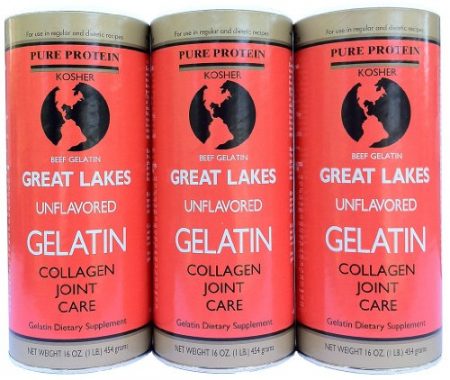
You can buy Great Lakes Gelatin Here
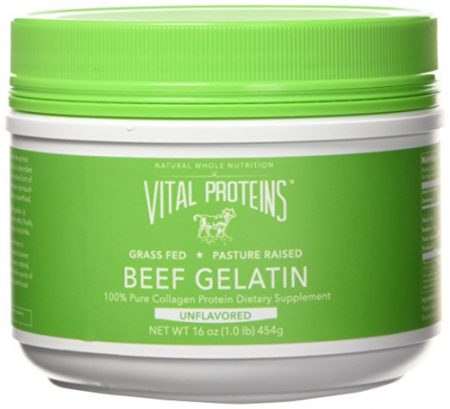
You can buy Vital Proteins Gelatin Here
Want to learn more about gelatin? Download The Gelatin Secret. It contains useful information about how to use gelatin, its health benefits, and dozens of great gelatin recipes. Get your copy here.
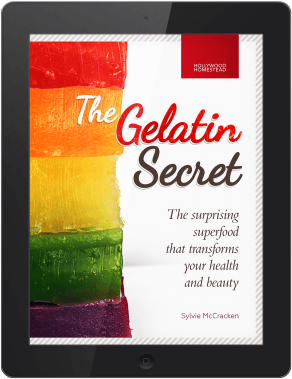
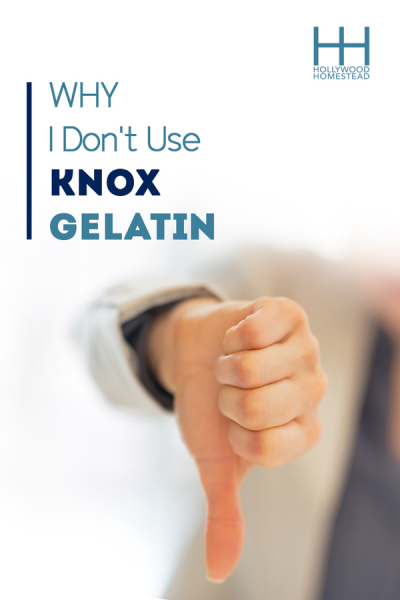
Latest posts by Sylvie McCracken (see all)
- Treating H. Pylori (Part 3): What H. Pylori Does to the Body - August 8, 2022
- Treating H. Pylori (Part 2): How H. Pylori is Contracted - August 3, 2022
- Understanding Beef Labels: Organic, Pastured, Grass-Fed & Grain-Finished - July 25, 2022
I have been using Vital Proteins for my homemade “fruit snacks”. However, I cannot stand the “wet dog” or “feedlot” smell. My oldest daughter (2 year old) gobbles every flavor up. My other 3 children won’t touch them after trying them once. I can’t stomach them either as they have a feedlot smell and taste to them. Any suggestions on how to reduce that smell and flavor? I thought about adding more honey or using a stronger tasting fruit but I don’t want to increase sugars either.
Having read the full article, I agree it is suspicious when only ONE gelatin company will not give information on HOW they make their gelatin and HOW the cows are looked after. To omit this from their website, as with any other product that does so, is SUSPICIOUS, and not worth bothering with, when their others to choose from.
Are we not sick of having the truth withheld from us?
I tried to make this Knox up, but it was so sticky and gummy that I threw it away. It just would not melt or mix properly. That was suspicious enough, even before I read this great exposing article. And, of course it is a good idea to give options for a better brand of gelatin. Check out their websites and compare them to Knox, and you should make a better decision!
I have been giving Great Lakes to a malnourished puppy in powdered form, in his kibble. Dry dog food lacks enzymes that are critical for healthy skin and hair and joints, I take Bulletproof collagen in my coffee daily. The puppy is thriving and has the softest fur you can imagine. I am age 60 and my skin and joints have never been better. If there is a toxic element to this I am not experiencing it. I also believe in grass fed beef products, organic if possible. I have a friend in her early 80’s who has had stem cell on her knees and was told to take collagen during recovery, she tried to stop to save money but her pain came back. I may reduce the amount of collagen I take in the future but my skin was aging badly and was not healing well, and I am not a vegetarian. My skin has never been softer and is healing normally again. I am not sure why this information is being met with such anger. Do any of you work for the company that produces Knoxx? Just in case you are interested, collagen and gelatin have a very similar nutritional profile, amino acids are critical, I don’t think we are getting enough, also collagen is lost as the body ages so if you have joint issues, as many older adults do, or if you have a dog who eats kibble, which is cooked and dried at high temperatures, you may benefit from high quality gelatin or collagen.
Thanks so much for the information in your article, it confirms my own experience.
Is it counterintuitive to seek out a vegetarian or vegan gelatin product? I want to feed a gelatin product to my Off The Track Thoroughbred horse’s to help strengthen their feet. I am already supplementing them with biotin and methionine.
It is just weirding me out to contemplate feeding horses a beef by product. Can’t do it!!
Any suggestions would be welcome.
Thank you,
Tracey
Sounds like a marketing ploy to me. If the product is so wonderful that shouldn’t have to bash Knox .
NO thanks ????
Did you even read the article? :/
Many years ago I tore the tendon in my left knee, and then years later I bashed my right knee in a bicycle accident. My hair was also starting to look like hay. For a long time I couldn’t walk without some pain. When I started taking turmeric, the pain lessened, but when I started taking Knox gelatin along with the turmeric the pain has almost disappeared completely. Knox definitely works, at least for me, and it has helped the health of my hair. BTW, castor oil is great for the skin.
Out to make more money huh….by bashing another product no thanks!
That literally makes no sense, Kathryn 🙂
You lost me when you touted “no GMOs” as a reason to use products like Great Lakes. There is nothing intrinsically wrong with GMOs, and if you believe there is, I can’t see any reason to believe any of your other claims.
Hilarious
????????
Well, you Bruce are probably very unhealthy and are doing just what you are told! Eat GMO’s get all the mRNA shots you can, and still say they don’t harm anyone.
“But when we ingest TOO MUCH in free form, it becomes a neurotoxin”
So is powdered gelatin used for making homemade yogurt considered “free form”?
Sorry I’m a bit confused.
But what about the GLUTAMATE content of ALL gelatin, even the supposed “good” ones. Gelatin is still a highly processed product. As it states on the Great Lakes page… “Gelatin is the purified protein derived by the selective HYDROLYSIS of collagen from the skin, the connective tissue and/or bones of animals.” Gelatin is NOT a natural product and it is filled with PROCESSED FREE GLUTAMATE. Any time any protein containing food is processed in any way, including high temperature, autolysis, fermentation, bacteria, enzymes, acids, hydrolysis, etc., the bound glutamate is released into its free form, thus we create PROCESSED FREE GLUTAMATE. When bound (in food), it enters our system slowly as the body breaks it down during digestion and assimilation. But when we ingest TOO MUCH in free form, it becomes a neurotoxin. Glutamate is an excitatory neurotransmitter. We need some glutamate, but our body creates what it needs (endogenous). If we add excess, which often happens when we ingest exogenous glutamate from processed “food” sources, we can get too much, and then it becomes an excitatory neurotoxin that causes neurons to die. Everyone has their own personal “threshold” so the toxic dose will not be the same for everyone. And then if an individuyal has certain genetic defects, for example those that control the GAD enzyme, which helps convert glutamate to GABA, then a build up of glutamate can occur more easily. Glutamate is implicated in every neurodegenerative disease including Alzheimer’s, ALS, MS, Parkinson’s, Epilepsy, Huntington’s, restless leg syndrome, migraine, etc. Look at many of the drugs used to treat these conditions, such as Lyrica, Memantine, Remacemide, Riluzole, Lamotrigine, Budipine and Gabapentin, to name a few. All of these drugs block glutamate! Be careful messing with neurotransmitters. You can find the symptoms of glutamate toxicity by doing some research. It varies among individuals. Just remember that glutamate is excitatory so look for symptoms that are related, for example insomnia. Not everyone will have a problem with consuming gelatin or other processed sources of free glutamate but this is just a word of caution. Have you ever inquired about how much PROCESSED FREE GLUTAMATE is found in either Great Lakes or Vital Proteins gelatin? It can be measured.
Are there any gelatin sources from chicken or turkey?
Not sure about turkey, but chicken gelatin is available. Mostly made from feet.
thank you sylvie for informing us of yet another insult to our health from the era of SAD. i thought they had done enuf to poison us off. but no, adulterated gelatin. another subject: should we be concerned about a salty tasting amino acid product by very popular health oriented company? it is in the home spice rack of most people i know. it has nearly equal horrors to the knox gelatin process.
Hi Robert,
I’m not sure what “salty tasting amino acid product” you’re talking about so I’m afraid I can’t comment. But as usual, check ingredients and if something doesn’t look quite right reach out to the company and ask questions. Most companies are happy to answer, especially those that have nothing to hide. 🙂
Best,
Sylvie
What animal sources pig or beef?
Hi. Hadn’t bought gelatin in a while so I bought Knox, now imported from Argentina. Was making “jello” from healthy juice. When I added the gelatin to hot water, it smelled like a feedlot, i.e. rotten manure. Rethought my dessert plans! I’m so glad there are alternatives.
Gelatin powders may have a unpleasant smell when air-borne or being mixed. I’ve never know any to impart even the slightest taste, however.
Just this morning my husband decided to make some gellatin up but as it went lumpy and literally just stuck to itself, he gave up. It just didn’t seem right, or act like other gelatins.